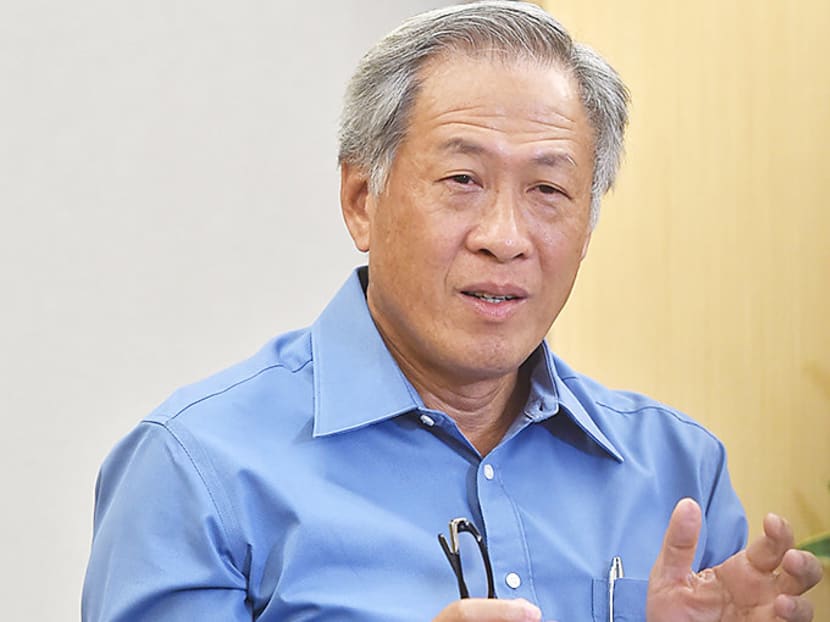SAF reorganising to tackle challenge of hybrid warfare
SINGAPORE — Against the backdrop of a shrinking military force and neighbouring countries boosting their defence budgets, Singapore is modernising its defence systems and gearing up to meet the challenge of hybrid warfare.
SINGAPORE — Against the backdrop of a shrinking military force and neighbouring countries boosting their defence budgets, Singapore is modernising its defence systems and gearing up to meet the challenge of hybrid warfare.
Defence Minister Ng Eng Hen in a media interview last Friday ahead of Singapore Armed Forces (SAF) Day tomorrow (July 1) said the SAF will increase the number of unmanned systems, and the proportion of units operating wheeled or tracked vehicles in the army will go up from the current 25 per cent to 50 per cent and could increase even more.
“Demography is our largest challenge,” he said, noting that the number of conscripts will fall by a third in the next 15 years.
But the SAF’s strategy has never been to compete on numbers, he said.
“That would be the weakest basis to compete, because that’s what we lack. But it’s always been with superior skills and knowledge, intelligence, information and technology.”
The SAF is also looking at new infantry vehicles and ships that combine both manned and unmanned systems which the lean force can optimise to its advantage, he said.
For instance, the recently acquired Unmanned Aerial Vehicles, artillery systems and lean frigates can be operated with a fraction of the manpower their predecessors required.
“(It’s about) integrating systems so you have multiplier effects, (with) small teams which are able to see first and effect quicker, and able to call on the resources of the Army, the Air Force, and the Navy at one time.”
Dr Ng said that based on projections until 2050, there is no need to extend the two-year National Service stint or make it obligatory for women “at this point in time”.
“But it does mean that our systems will require national servicemen to do more things (and) take on higher responsibilities,” he said.
The SAF’s efforts to overhaul its systems have also allowed more regulars and national servicemen — including those who are less combat fit — to be deployed in areas which require more intelligence, such as the Cyber-Defence Operations Hub set up two years ago.
MINDEF will scale up deployment in cyber operations as the threat of hybrid wars rise, Dr Ng said.
As a small country and an open economy subject to varying influences, Singapore is particularly susceptible to hybrid warfare, he said, adding that the SAF has already begun to re-organise and acquire new capabilities to meet this challenge.k
“It can cripple your systems. It can steal your secrets. It can give misinformation to your people so that it affects morale. This is exactly what we saw…in Ukraine and Crimea.”
Dr Ng also highlighted rising nationalism among Asian countries — particularly large economies like China, India and Indonesia — as another challenge, noting that defence spending in the region has outstripped Europe.
“The clarion call is that our country must rise, our country must protect our interests. In that context, the very optimism that this is an Asian century (where) you are able to determine your own future and you have harnessed bigger resources for your own nation...But obviously, things can also go wrong, as it has in Europe, and other parts of the world… When that happens, small countries suffer first and predominantly.”
As a small country with a “primarily deterrent” military, Singapore maintains close relationships with neighbouring countries, he said.
“Whether it is the Malaysian Armed Forces or Tentara Nasional Indonesia (Indonesian National Armed Forces), they are close interactions that we do… many of the (transnational) problems will mean we have to do it collaboratively with other militaries,” he said.
While the SAF must continue to transform its systems to manage new challenges in complex environments, Dr Ng stressed that it is important for younger soldiers to identify with the ethos of a strong defence force.
Singapore’s pioneer soldiers, having undergone suppression under the colonial rule and Japanese Occupation, were “thoroughly convicted” that Singapore has to be defended. The same resolve and grit must be passed on to future generations, he said.
“These bitter and painful lessons they experienced first-hand etched in them a deep conviction… they learnt that you can only own what you can defend. If you can’t defend it, you don’t own it… It was a simple, clear, fundamental tenet of living that they learnt.”
CORRECTION: An earlier version of this article reported that Dr Ng Eng Hen said the SAF will boost the existing fleet of motorised vessels in the air force and navy and introduce new unmanned systems for land, and that the proportion of motorised vehicles in the army will go up from the current 25 per cent to 50 per cent and could increase even more. This is incorrect. Dr Ng said the SAF will increase the number of unmanned systems, and the proportion of units operating wheeled or tracked vehicles in the army will go up from the current 25 per cent to 50 per cent and could increase even more. We are sorry for the error.







